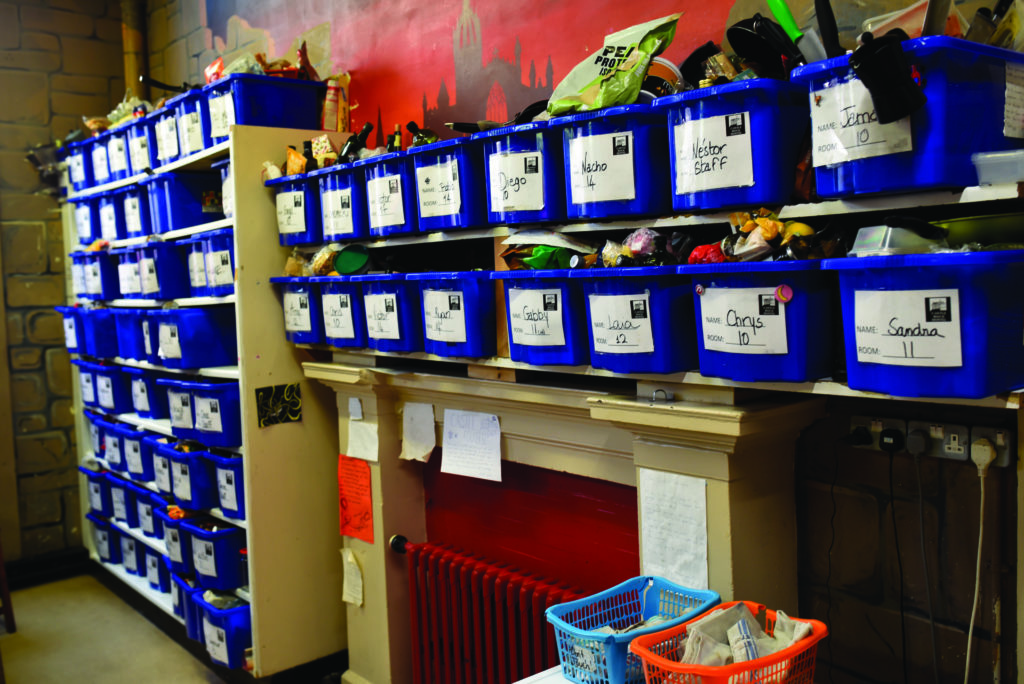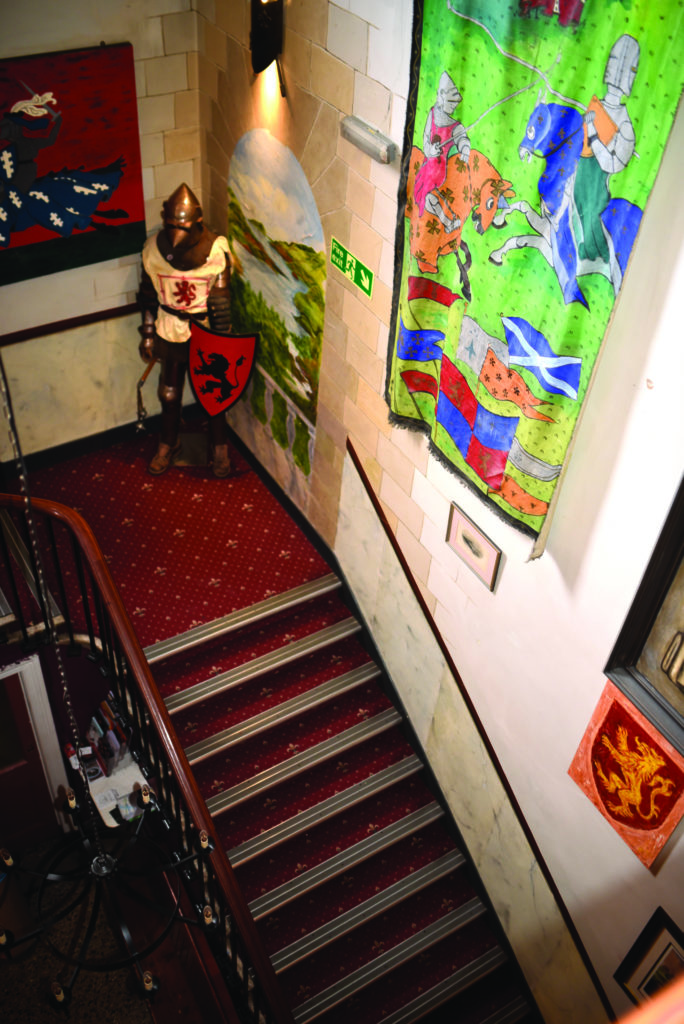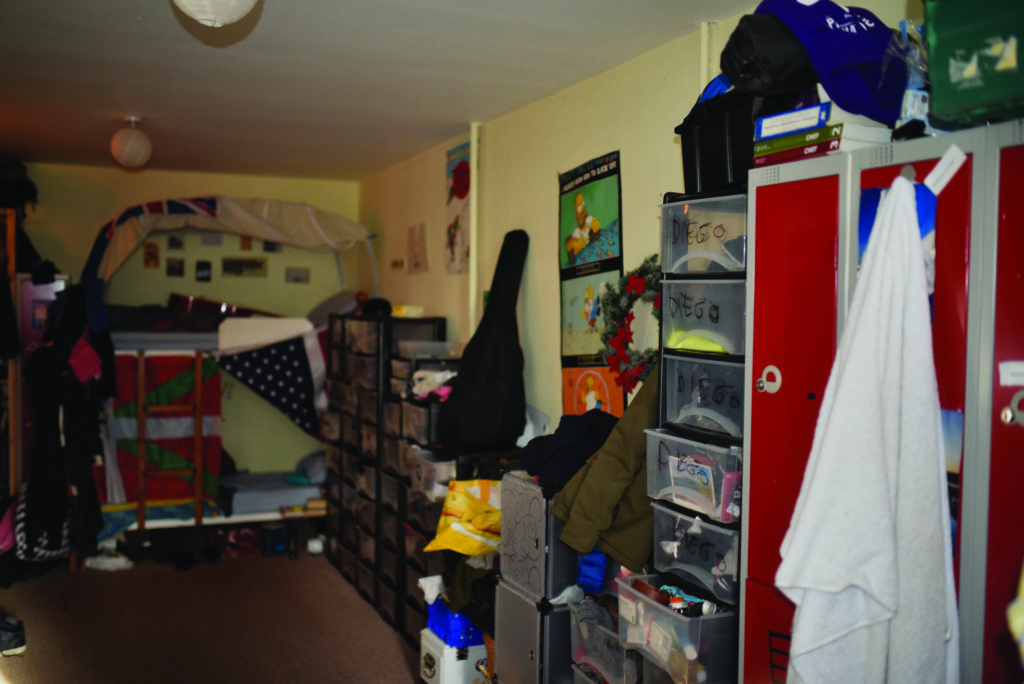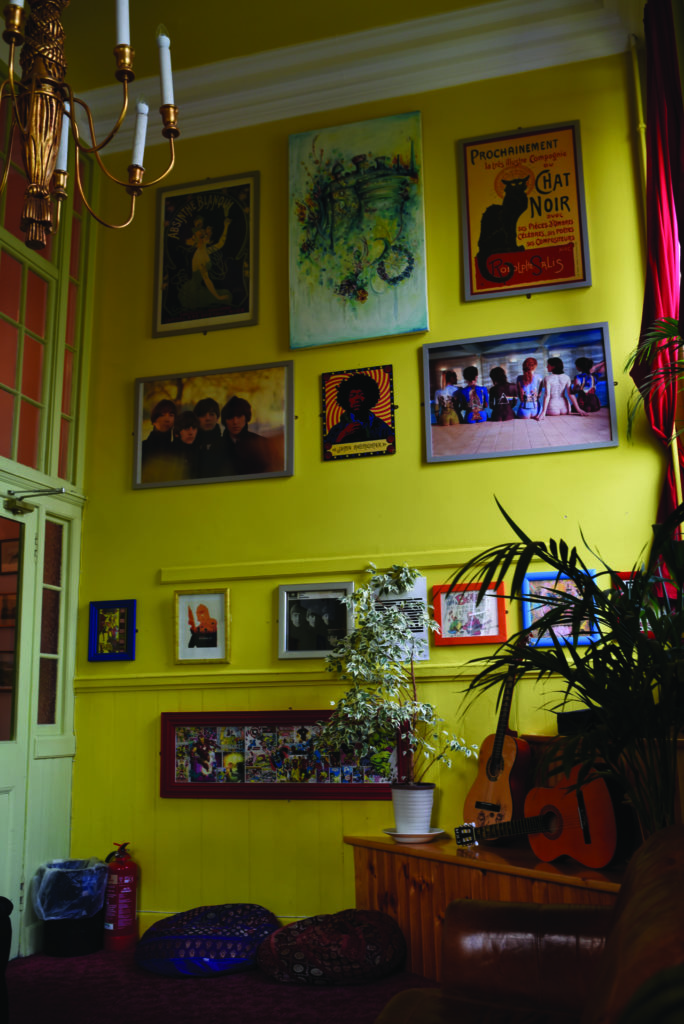Becoming a volunteer: behind the scenes of a youth hostel in Edinburgh
At Castle Rock Hostel, around 60 volunteers live and work together, sometimes for many years. They compose a close-nit and warm society, yet caught in fluctuating power dynamics.

Castle Rock Hostel accomodates 200 guests every night. Photograph: David Purvis
This is a story of a world within a world, one which you enter without knowing why, but the charms of which act so powerfully then it becomes difficult to make your way out of it. This world is formed by the sixty volunteers of Castle Rock Hostel, a majestic 19th century building in the heart of Edinburgh’s old town and turned into a youth hostel in the early 1990s. This world is the one in which I’ve been myself involved when I first arrived in Edinburgh, between January and March 2019.
The conditions to penetrate this secret society are such: you accept to work around 14 hours a week, share a dorm with eight to fourteen people and promise to stay at least one month. In exchange, the gates of heaven open or, in other words, you get free accommodation. A windfall for many young people just landed in Edinburgh, who recognise the opportunity of meeting people while postponing the unattractive perspective of looking for a flat. Nacho, a 31-years-old Spanish volunteer, who arrived in Castle Rock in April 2017, recalls his arrival in Edinburgh: “There were so many people looking, it was crazy. I gave up the idea”.
I succumbed myself to the siren song of volunteering when I understood the difficulty of finding a flat. Average rents in the Lothian area, where Edinburgh is located, have increased of roughly 50 % between 2010 et 2019. As a result, a room in a flatshare for less than £450 (not including utility bills) has become a rarity. So, after five or six failed attempts, I ended up joining the Castle Rock’s volunteer’s army.

In the kitchen, each volunteer receives a box to store their food. Photograph: David Purvis.
In the hostel, one day merges into the other. Every morning, we have to attend a meeting at 10 o’clock, when the “headcleaner” divides the tasks among the volunteers. Hoover the hallways, scrub the toilets and showers, change the bins in the rooms, make the beds, polish the eight hobs in the kitchen… There are plenty of chores in this massive home, which accommodates roughly 200 guests every night. And when there is a shortage of work, tasks can be invented: one day, I literally spend two hours cleaning the baseboards of the castle. Indeed, there had to be a justification for me having a free bed.
Our shifts start at 11am and last around two hours. It is not very complicated but still tiresome: we usually have to go up and down the four floors of the hostel armed with a hoover, several buckets or bags filled with linens. Volunteers are regularly half-asleep or hungover. To be fair, the average age is 23 years-old and nights out very frequent.
“I met some amazing people, we had so much fun. When I flew back home for Christmas, there was no way I wouldn’t come back”
After the cleaning, volunteers scatter throughout the hostel. Some of them like me would rather take a shower before heading to the kitchen to prepare something for lunch. A ritual which always takes ages, given that, beforehand, you have to put your hand on the single pan that doesn’t burn your food, spot the reasonably well-functioning oven and wait patiently for your meal to be ready. When you’re done with it and dishes are clean, it’s already 3pm and a little time left to enjoy the city. In Edinburgh, winter days are very short and night falls around 4pm. Regularly, early evening would arrive unexpectedly, leaving yourself to wonder where the day went.
However, the atmosphere in the hostel is warm and welcoming. Spanish, Italians, British, New-Zealanders, Uruguayans, Australians, French, Hungarians, Polish, Israeli, South-Africans, Finnish… Volunteers come from all around the world and their mingling result in a sparkling cultural mix. Between flirts, friendships, pub crawls, escapades to the Highlands, diners organised for some twenty people, screenings in the movie room, strolls in the surrounding nature, life looks like an endless holiday camp for grown-ups. Anais, a 22-years old German girl, who arrived in Castle Rock in November 2017 and stayed two years, recalls making friends very quickly: “I met some amazing people, we had so much fun. When I flew back home for Christmas, there was no way I wouldn’t come back”. From the outside, Castle Rock Hostel seems to be a whirlwind of parties thrown by a gigantic family, in a kind of hippie and international place where everyone is equal. The picture is idyllic.

Inside, the hostel looks like a medieval castle. Photograph: David Purvis.
Over time, the paint however tends to flake a little bit. Castes, groups, the “family” emerges as being a society just like any other, with its codes, its privileges, its exclusions, its takeovers. As a consequence, a proper hierarchy dominates volunteers, who are not exactly in the same boat.
At the bottom of the ladder, there are the “infantry soldiers” like me, compelled to attend the morning meeting in order to be assigned dirty jobs. A little above us in the food chain, there are volunteers who have been living here for a few months and have obtained the right to prepare breakfast or do laundry. Their shifts last five hours instead of two and are given with some notice, which enables them to organise themselves. In the same category, you also find volunteers who evade the cleaning by running events for guests.
And then, still above, there are the “highly ranked” volunteers, those that are referred as “staff”, although they are not paid by the hostel. To them belongs the private fridge in a cellar, breakfasts on the house, trips to the Highlands with tourists for free, the right to occupy the cinema room when it is closed to the public, and above all: the allowance to sell their hours. Because a volunteer can, if he works more than his fourteen hours a week, build up some hours and use them to go on holiday without losing his bed. But only the “staff” are allowed to sell them to the other volunteers, often at some advantageous prices. Whereas a night in a dorm usually costs £12, the “staff” sell them at £10. It is a deal that suits everyone: “highly ranked” ones can profit from a regular income where the simple volunteers can, instead of cleaning, get a bed for almost nothing. Anais, who became “staff” six months after a coming back in February 2019, used to earn £70 a week this way.
But before reaching this level of power, you would have to deserve it. “I cleaned a lot when I arrived in the hostel. I used to do double shifts very often. By the summer, I would have built up enough hours to go on holiday for a month. And this is exactly what the management pays attention to: how involved you are. I went away in July and when I came back I was being made staff ” she tells.
“Sometimes promotions only involve an element of chance. You might be at the right place at the right time.
But sometimes, getting promoted also depends on your connections, rails Raphaël*: “It looks like high school. The management tends to choose their friends to become staff, even if they’re not hardworking. I remember there was a point when the harder I worked, the more they gave me the worst shifts while letting their friends do nothing.” But Jean*, another volunteer, qualifies: “Sometimes promotions only involve an element of chance. You might be at the right place at the right time. Example: somebody doesn’t wake up for breakfast, but you’re around so you do it instead even though you haven’t been formally trained. Suddenly you get to do breakfast from that point on”.
On the highest point of that pyramid are the former volunteers who had become employees of the hostel. Among them: the “head cleaner”, one web designer/community manager, one night porter, two assistants managers and one top manager. When I lived there, the latter was a 23-years-old girl from Canada. Almost all of them had private rooms.

Room 10, usually reserved to the old volunteers. Photograph: David Purvis.
As in any other company, the access to positions of responsibility is therefore a right mix between merit, patience, social relationships and…luck. And as in any other company, privileges in Castle Rock rise with seniority. As a matter of fact, the newest volunteers generally inherit the worst dormitories. Among the men, the difference strikes particularly. Room 14, where the newbies usually land, is a 14-bed dorm, the unbearable smell of which jumps into your face and where respect of other’s sleep is a foreign concept. Néstor, a 31-years-old Spanish volunteer, who arrived in Castle Rock in March 2017, smiles when remembering one of his first night in this room: “Three guys showed up with three other girls, who they started to sleep with. And then two other couples came in, one of whom under my bunk bed. In the end, there were five couples having sex in the room and they were pretty loud!”
This unpleasant encounter didn’t put him off and he stayed. Definitely a good call because two weeks later, Néstor would move to room 10, an extremely well-converted 10 bed dorm, where a nice clean smell always floats in the air. Over there, all is order and beauty: rules of good behaviour are strictly enforced and some meeting regularly take place to improve the layout of the room and sometimes resolve disagreements.
For women, the seniority system also prevails. Room 13, in which I stayed, was reserved to the new arrivals. We were eight girls in a room of twenty square meters with a small amount of storage. It was admitted that the roommates, potentially temporary guests, were allowed to be loud. The “old ones”, lived in rooms 11 and 12, two dorms that were more crowded but also better converted and in which silence was more respected. Over there, beds resembled personalised cocoons: girls would have put up pictures and posters, sometimes wall hangings. In a nutshell, everything indicated a long-term stay.

The shoes of the volunteers in room 10, carefully stored. Photograh: David Purvis
At Castle Rock Hostel, privileges associated with seniority don’t end at the room’s choice. Even within the dorms, a hierarchy emerges between the newest volunteers who sleep in top bunks, and the old ones who sleep in bottom bunks, which make it possible to hang some curtains on and thus create some privacy. A luxury in an environment where, by design, it is impossible to be left alone. As a result, beds sometimes represent real power games. Sunil, a 31-years old Spanish volunteer, who stayed in room 10 for about 10 months recalls having been under pressure to leave his bottom bunk: “One staff had decided that thanks to his status, he could obtain that bed I was waiting for. But I was in a queue for a long time, I didn’t give in”.
Staff, simple volunteers, employees, inhabitants of bottom and top bunks, all of them have something in common however: when they arrived, the hostel experience was only about having fun. Some of them had landed there during their gap year or because they wanted to have a break in their lives: many Australians, for example, choose to travel around Europe and then make a stop at Castle Rock for several months. To them, life in the hostel is part of their great expedition, only an enchanted interlude in which they want nothing but to have fun. Besides them, you would find all of whom who fled from something: a burn-out, a heartache, a dysfunctional family, a country in which they feel out of place, where they sometimes don’t find a job regardless of their multiple diplomas. Therefore, when they arrive at Castle Rock Hostel, it’s party time, at least for a while. Yiannis*, a 28-years Greek man, who became a volunteer in October 2016, recalls his arrival: “At the beginning I was like everyone else, simply partying hard over the first six months”. Anais has the same memories: “Over a year, I primarily had fun”.
And then comes the times when you have to find a job, get involved in a project or some studies and when the hostel loses some of its appeal. Because the volunteers are, at this point, obliged to combine different commitments and sometimes end up with very busy weeks. I remember my friend Talia for example, a 24-years-old Australian girl who was working around 40 hours in another hostel in town besides her 10 hours as volunteer in Castle Rock. Yiannis, who juggled dance classes, part-time work as waiter in a club and his hours as volunteer ended up falling apart: “I had a nervous breakdown. My brain was constantly being stressed, I had no time for myself anymore”.
Because all of them say it: the hostel can suck you in. “One time, I stayed in the hostel four days in the row, without going out. It is so easy, there is always somebody available for having a chat, cooking or watching a movie. Everything is within reach, inside. It’s like a bubble!” tells Nestor. Enrico, a 25-years-old Italian man who lived in Castle Rock for several months in 2019, reports the same story: “It’s such a strange environment, all your social life revolves around the hostel. You usually find a job where other volunteers also work and most of the time, you end up hanging out with them only. At the end, you realise that although you live in Edinburgh, you don’t know anyone from the outside!”
“People living in the hostel were, in most cases, travellers. It was easier to not think about your own future while living with them”
In fairness, the hostel has something enchanting in the way it brings comfort while removing responsibilities: “We had no bills to pay, when something was broken, it was fixed for us. It was not like real life”, recalls Anais. Enrico also remembers an incredible freedom: “We could change job easily because we knew we’d always have a roof above our head. And we could leave Edinburgh on an impulse. Besides, people living in the hostel were, in most cases, travellers. It was easier to not think about your own future while living with them”.
Paradoxically, living in Castle Rock Hostel has helped some of the volunteers to structure themselves: “I sometimes find myself thinking that I have grown up more in this hostel that if I had had a normal life outside. It is a pretty crazy environment, full of people who want to party most of the time and regularly ask you to come along. We need to find the strength to resist to the temptation, to stay focus. It hardens you somehow”, tells Federico, a 23-years-old Uruguayan man, who has been living in the hostel for 3 years.

The groove lounge, where the morning meeting is held daily. Photograph: David Purvis.
Like him, some volunteers let themselves be lulled into this life for months, sometimes years. It is said that one volunteer has been living there for six years, twelve for another one, without anyone ever daring to ask. How did they manage to live for so long without privacy? Jessica, a 29-years old French girl, who stayed in Castle Rock for 4 years and half, including three in a dorm, relates: “It was a good experience. I was a little bit tired but everything was fine. I always loved to go to summer camp, it never bothered me to share my space for a long time”. Gergely, who has been living in the hostel for two years, echoes this sentiment: “I’ve got nine other siblings, I always shared my room. For me, it was natural”.
Not to mention than living in the hostel enables to save up a lot of money. “Financially speaking, I could have moved out in a flat. But I also support my mum back home and in general, I’d rather to keep this money for something else than rent”, tells Yiannis. For Nacho, it’s another story. He lives in room 14 and has been working for two years around 50 hours a week as deliveroo driver and combines some ten hours working at the hostel. A lifetime of hard work which its sole aim is to open his own hostel in Tenerife. “This a sacrifice that I make for later. If I need to stay two years more, I’ll do it”, he told me in July 2019. Almost one year later, he’s still there.
*the names have been modified